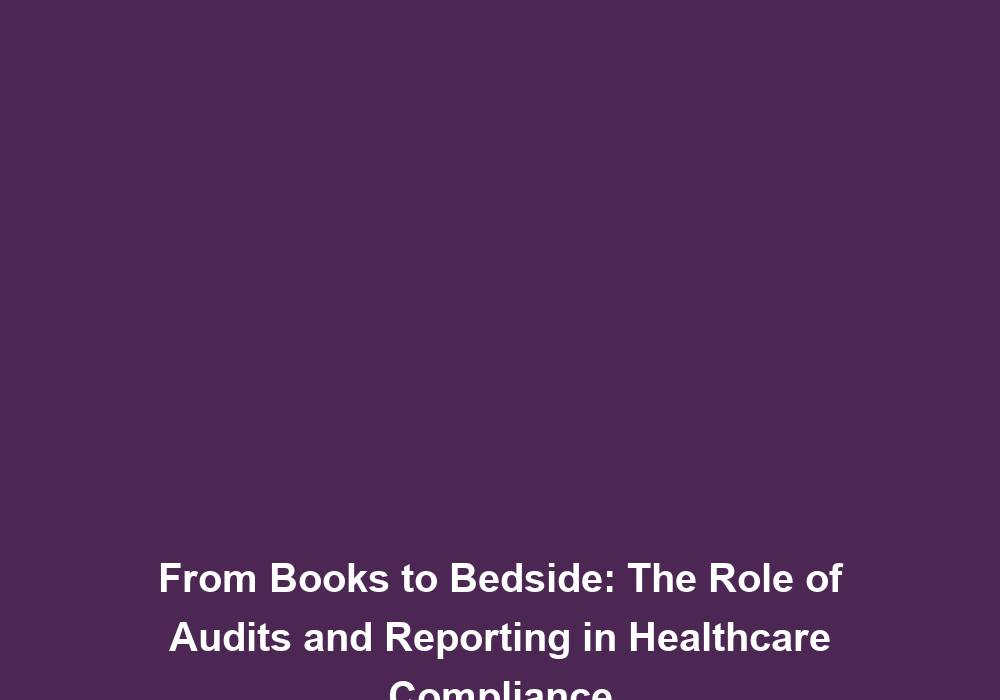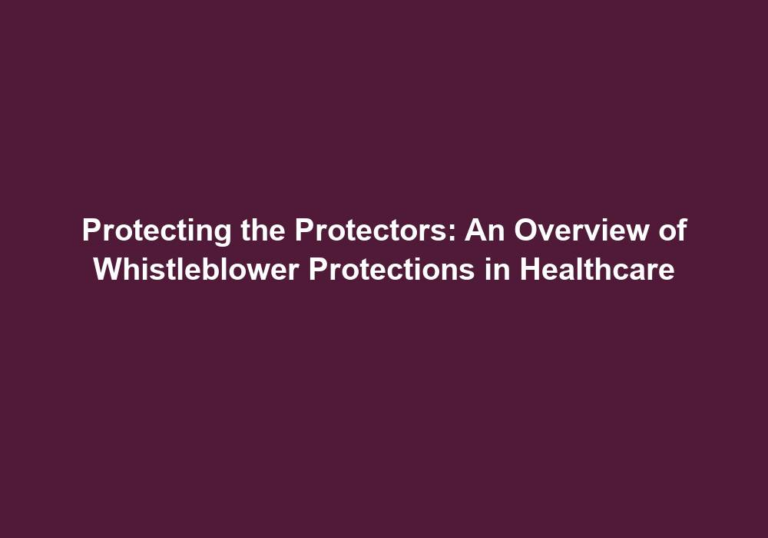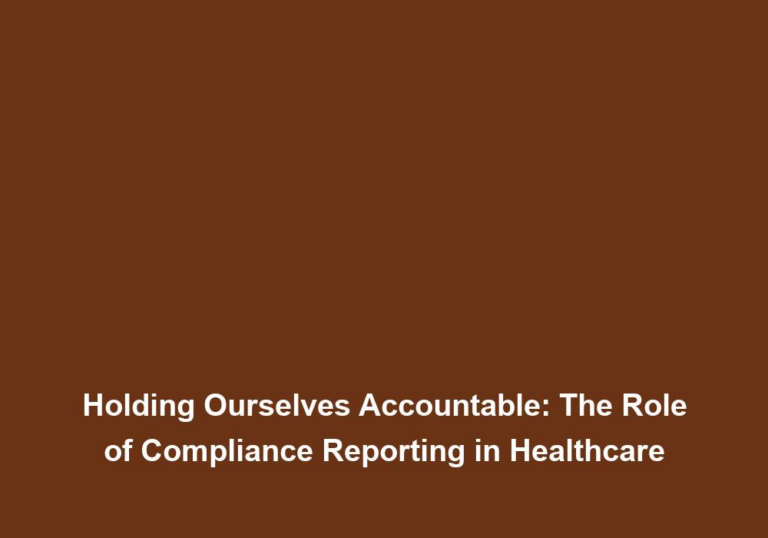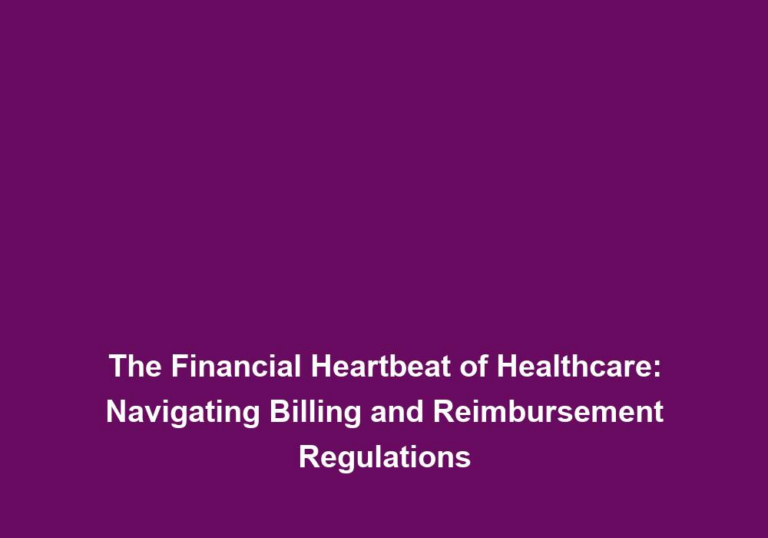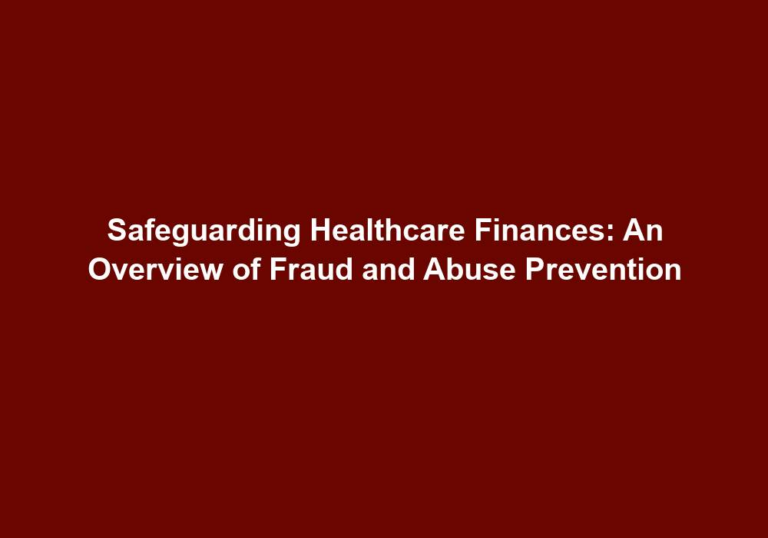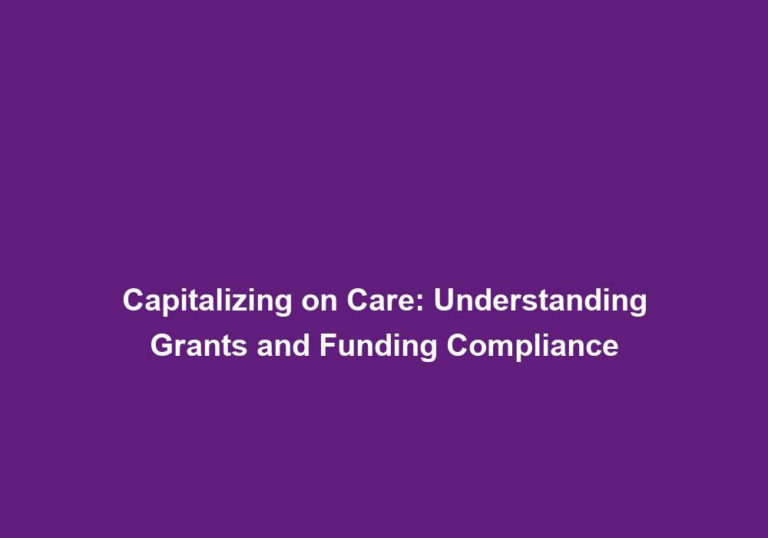From Books to Bedside: The Role of Audits and Reporting in Healthcare Compliance
In the ever-evolving world of healthcare, maintaining compliance is of paramount importance. Healthcare providers, organizations, and facilities must adhere to numerous regulations and standards to ensure the delivery of high-quality care and protect patients’ well-being. One crucial aspect of compliance is audits and reporting, which play a vital role in assessing and improving healthcare practices. In this article, we will delve into the significance of audits and reporting in healthcare compliance, exploring their benefits, processes, and key considerations.
Understanding Audits in Healthcare Compliance
Healthcare audits are systematic examinations of healthcare providers’ practices, policies, procedures, and records to evaluate adherence to legal and regulatory requirements. These audits are conducted by both internal and external entities to ensure that healthcare organizations operate in accordance with established guidelines. They help identify areas of non-compliance, identify risks, and enable corrective actions to be taken promptly.
Types of Audits in Healthcare Compliance
-
Internal Audits: These audits are conducted by an organization’s own internal audit department or team. Internal audits help healthcare organizations identify and rectify compliance gaps and potential risks before external audits occur. They play a crucial role in ensuring ongoing compliance and reducing the chances of costly penalties or legal ramifications.
-
External Audits: External audits are conducted by independent third-party organizations, such as government agencies or accrediting bodies. These audits assess healthcare organizations’ compliance with specific regulatory frameworks, such as the Health Insurance Portability and Accountability Act (HIPAA) or the Centers for Medicare and Medicaid Services (CMS) regulations. External audits provide an impartial evaluation and often result in formal certifications or accreditations.
Internal Audits
Internal audits serve as a proactive measure for healthcare organizations to identify and rectify compliance gaps and potential risks before external audits occur. By conducting regular internal audits, organizations can assess their adherence to legal and regulatory requirements, identify areas of non-compliance, and implement corrective actions promptly. These audits typically involve a comprehensive review of policies, procedures, and records to ensure that healthcare practices align with established guidelines.
During an internal audit, the organization’s internal audit department or team examines various aspects of healthcare operations, including documentation practices, data privacy and security measures, billing and coding processes, and patient safety protocols. By thoroughly evaluating these areas, internal audits help identify any deficiencies or non-compliant practices, allowing organizations to take corrective actions and mitigate potential risks.
Key benefits of internal audits in healthcare compliance include:
-
Proactive identification of compliance gaps and risks: Internal audits enable healthcare organizations to identify and address compliance deficiencies before they are discovered during external audits or regulatory inspections. This proactive approach helps prevent costly penalties and legal ramifications.
-
Ongoing compliance monitoring: By conducting regular internal audits, healthcare organizations can establish a culture of continuous compliance monitoring. This ensures that compliance efforts are consistently evaluated and improved, reducing the likelihood of non-compliance incidents.
-
Enhanced organizational efficiency: Internal audits provide valuable insights into healthcare operations, allowing organizations to streamline processes, improve documentation practices, and enhance overall efficiency. By identifying areas for improvement, internal audits contribute to the continuous improvement of healthcare practices.
External Audits
External audits are conducted by independent third-party organizations, such as government agencies or accrediting bodies, to assess healthcare organizations’ compliance with specific regulatory frameworks. These audits provide an impartial evaluation of adherence to standards and often result in formal certifications or accreditations. External audits play a crucial role in ensuring transparency, accountability, and maintaining public trust in healthcare organizations.
During an external audit, auditors review the organization’s policies, procedures, records, and practices to assess compliance with regulatory requirements. The audit process may involve interviews with key personnel, examination of physical facilities, and a thorough analysis of documentation. The findings of an external audit are typically documented in a report, which highlights areas of non-compliance and provides recommendations for improvement.
Key benefits of external audits in healthcare compliance include:
-
Independent evaluation: External audits provide an unbiased assessment of healthcare organizations’ compliance efforts. This impartial evaluation enhances the credibility and reliability of compliance practices, instilling confidence in patients, stakeholders, and regulatory bodies.
-
Formal certifications and accreditations: Successful completion of external audits often leads to formal certifications or accreditations, demonstrating a healthcare organization’s commitment to meeting industry standards and regulatory requirements. These certifications enhance reputation and can attract patients seeking high-quality care.
-
Identification of system-wide improvements: External audits often identify system-wide improvements that can enhance patient safety, privacy, and overall quality of care. The audit findings provide valuable feedback for healthcare organizations to implement necessary changes and elevate the standard of care provided.
The Importance of Audits in Healthcare Compliance
Audits serve several crucial purposes in healthcare compliance:
-
Identification of Non-Compliance: Audits help identify areas where healthcare organizations are not adhering to legal requirements or industry standards. By thoroughly examining policies, procedures, and records, audits pinpoint deficiencies and non-compliant practices, enabling organizations to take corrective actions.
-
Risk Mitigation: Audits play a pivotal role in identifying potential risks and vulnerabilities within healthcare organizations. By uncovering areas of non-compliance, audits allow organizations to implement appropriate controls and procedures to mitigate risks and safeguard patient safety and privacy.
-
Continuous Improvement: Audits provide healthcare organizations with valuable feedback and insights into their operations. By analyzing audit findings, organizations can identify areas for improvement, enhance internal processes, and elevate the overall quality of care provided.
Audits not only help healthcare organizations assess their compliance efforts but also contribute to the overall improvement of healthcare practices. Through the identification of non-compliance, mitigation of risks, and continuous improvement initiatives, audits ensure that healthcare organizations deliver high-quality care while adhering to legal and regulatory requirements.
The Role of Reporting in Healthcare Compliance
Accurate and comprehensive reporting is an integral part of healthcare compliance. Reporting ensures transparency, accountability, and the ability to monitor and measure compliance efforts effectively. It allows stakeholders, regulatory bodies, and the public to assess healthcare organizations’ adherence to standards and regulations. Let’s explore the key aspects of reporting in healthcare compliance.
Types of Reporting in Healthcare Compliance
-
Internal Reporting: Internal reporting refers to the process of sharing compliance-related information within an organization. It enables healthcare organizations to track their compliance progress, identify trends, and address any emerging issues promptly. Internal reports are crucial for effective decision-making, resource allocation, and overall compliance management.
-
External Reporting: External reporting involves the submission of compliance-related information to regulatory bodies, government agencies, or accrediting bodies. This includes mandatory reporting of incidents, data breaches, quality metrics, and financial information. External reporting ensures that healthcare organizations remain accountable to regulatory requirements and provides transparency to stakeholders.
Internal Reporting
Internal reporting plays a vital role in healthcare compliance management by facilitating effective communication, tracking compliance progress, and supporting decision-making processes. It involves the sharing of compliance-related information within the organization to ensure that all relevant stakeholders are aware of the organization’s compliance efforts.
Internal reports provide a snapshot of the organization’s compliance status, highlighting areas of strength and areas that require improvement. These reports often include metrics, key performance indicators (KPIs), and analysis of compliance data. By tracking compliance progress through internal reporting, healthcare organizations can identify trends, patterns, and emerging issues, allowing them to take timely corrective actions.
Key benefits of internal reporting in healthcare compliance include:
-
Enhanced decision-making: Internal reports provide valuable insights and data that support informed decision-making processes. By analyzing compliance metrics and trends, healthcare organizations can allocate resources effectively, prioritize improvement initiatives, and align their strategies with industry best practices.
-
Improved communication and collaboration: Internal reporting facilitates effective communication between different stakeholders, including healthcare professionals, administrators, compliance officers, and regulatory bodies. By sharing compliance-related information, healthcare organizations can collaboratively work towards enhancing patient safety, privacy, and overall quality of care.
-
Compliance culture development: Regular internal reporting fosters a culture of compliance within healthcare organizations. By promoting transparency and accountability, internal reporting ensures that compliance efforts are visible and measurable. This culture encourages all employees to actively participate in compliance initiatives and contributes to the organization’s overall compliance management.
External Reporting
External reporting is a critical aspect of healthcare compliance, as it involves sharing compliance-related information with regulatory bodies, government agencies, or accrediting bodies. This type of reporting ensures that healthcare organizations remain accountable to regulatory requirements and provides transparency to stakeholders regarding the organization’s compliance efforts.
External reports typically include mandatory disclosures of incidents, data breaches, quality metrics, and financial information. These reports are submitted to regulatory bodies or accrediting bodies as part of compliance obligations. By sharing this information, healthcare organizations demonstrate their commitment to meeting regulatory requirements and provide stakeholders with an understanding of the organization’s compliance status.
Key benefits of external reporting in healthcare compliance include:
-
Transparency and accountability: External reporting promotes transparency within healthcare organizations, ensuring that compliance efforts are visible and measurable. By reporting compliance data, organizations demonstrate their commitment to providing quality care and following regulations, fostering trust among patients, employees, and stakeholders.
-
Compliance validation: External reporting serves as a validation of a healthcare organization’s compliance efforts. By submitting reports to regulatory bodies or accrediting bodies, organizations provide evidence of adherence to standards and regulations. This validation enhances the organization’s reputation and can positively impact patient trust and satisfaction.
-
Regulatory compliance: External reporting is essential to meet regulatory requirements. By submitting required reports, healthcare organizations remain in good standing with regulatory bodies and avoid potential penalties or sanctions. Compliance with external reporting obligations ensures that the organization operates within the legal framework and maintains the necessary certifications or accreditations.
Benefits of Reporting in Healthcare Compliance
-
Transparency and Accountability: Reporting promotes transparency within healthcare organizations, ensuring that compliance efforts are visible and measurable. By reporting compliance data, organizations demonstrate their commitment to providing quality care and following regulations, fostering trust among patients, employees, and stakeholders.
-
Data-Driven Decision Making: Reporting generates a wealth of data that can be analyzed and utilized for decision-making purposes. By monitoring compliance metrics and trends, healthcare organizations can identify areas of improvement, allocate resources effectively, and align their strategies with industry best practices.
-
Improved Communication: Reporting facilitates effective communication between different stakeholders, including healthcare professionals, administrators, regulators, and patients. By sharing compliance-related information, healthcare organizations can collaboratively work towards enhancing patient safety, privacy, and overall quality of care.
Reporting plays a crucial role in healthcare compliance by ensuring transparency, accountability, and providing the necessary data for informed decision-making. Through accurate and comprehensive reporting, healthcare organizations can monitor their compliance efforts, demonstrate their commitment to regulatory requirements, and continuously improve their practices.
Key Considerations for Audits and Reporting in Healthcare Compliance
When conducting audits and preparing reports for healthcare compliance, several key considerations come into play:
-
Accuracy and Completeness: Audits and reports must be accurate, complete, and based on clear and thorough documentation. Ensuring reliable data and information is essential to provide an accurate representation of compliance efforts and avoid potential legal repercussions.
-
Timeliness: Audits and reporting should be conducted within predefined timelines to allow for prompt identification of non-compliance and timely corrective actions. Delays in auditing and reporting processes may expose healthcare organizations to increased risks and potential financial penalties.
-
Ongoing Compliance Monitoring: Compliance is not a one-time activity but rather an ongoing process. Healthcare organizations should establish robust systems and procedures for continuous compliance monitoring, including regular internal audits and timely reporting of compliance-related information.
-
Engagement of Stakeholders: Successful audits and reporting require active involvement and engagement from all relevant stakeholders, including healthcare professionals, administrators, compliance officers, and regulatory bodies. Collaboration and communication between these stakeholders are integral to ensuring effective compliance management.
In conclusion, audits and reporting are essential components of healthcare compliance, enabling organizations to assess their adherence to regulations, identify areas of non-compliance, and implement necessary corrective actions. Through effective audits and comprehensive reporting, healthcare organizations can continuously improve their practices, enhance patient safety, and maintain high standards of care.

